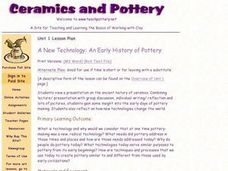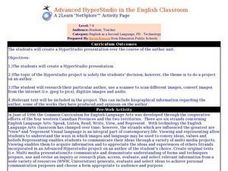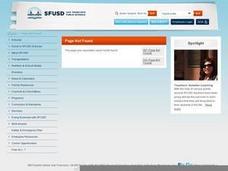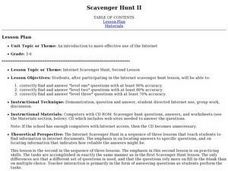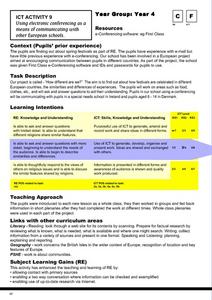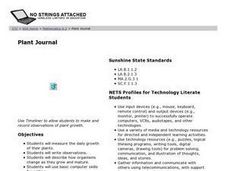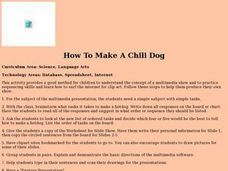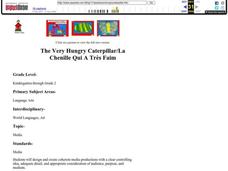Curated OER
Creating a Three-Dimesional Timeline
Students gather and order historical evidence surrounding the Silk Roads. They identify key people, places, and events in the history of the Silk Roads. They gain an understanding of the rich diversity of peoples and places found along...
Curated OER
A New Technology: An Early History of Pottery
Young scholars view a presentation on the ancient history of ceramics and gain insight into the early days of pottery making. They also reflect on how new technologies change the world.
Curated OER
Advanced HyperStudio in the English Classroom
Students create a HyperStudio presentation over the course of the author unit.
Curated OER
Gallery Walk/Webquest
Students participate in a gallery walk or Web Quest to study the various roles and processes in the Canadian government.
Curated OER
The Nesting Habits of Folders
Students create an organized web of nested grade level folers. Within each grade level folder, they create a Language Arts/Social Studies folder and a Math/Science folder. All folders be color coded.
Curated OER
Native American Project
Students explore the influences that geography has on a Native American tribe's culture and lifestyle. They examine how the first encounters with Europeans affected that tribe.
Curated OER
Geography: Snow Cover on the Continents
Students create maps of snow cover for each continent by conducting Internet research. After estimating the percentage of continental snow cover, they present their findings in letters, brochures or Powerpoint presentations.
Curated OER
Scavenger Hunt II
Students use the internet to complete a scavenger hunt. They must answer specific questions given to them by their teacher. They discuss the accuracy of websites as well.
Curated OER
Windows of Wisconsin (History)
Fourth graders research the history of Wisconsin. They explore Wisconsin's culture, sovereignty and environment. Using multiple computer technology resources (computer, scanner, camera, internet), 4th graders develop a book on the...
Curated OER
Ict Activity 9
Fourth graders experience and study electronic conferencing as a means of communicating with other European schools. They assess various ways of communicating with other students to compare similarities and differences between...
Curated OER
Somthing's Fishy
Students, using drawing tools on the computer, or with paper and pencil, diagram and label a fish.
Curated OER
Honey ! I Blew Up The Bee!
Second graders complete a variety of bee-themed activities. They consider the importance of honeybees in food production, conduct Internet research, prepare foods using honey, complete puzzles and compile a portfolio of their work.
Curated OER
Cyberspace
Students create original works of art or music and upload them to the Internet. They work individually or in a group. Then they collaborate with others to interpret, analyze, or alter the work.
Curated OER
Team Players
Students examine a school to career website. They collect and collate data about careers from their own data collection. They determine which skills and abilities ensure successful teamwork. They research two careers that they come...
Curated OER
Plant Journal
Students measure the daily growth of plants in this technology-based science lesson that uses Timeliner to record student data. The lesson allows students practice at basic computer skills (typing/data entry).
Curated OER
Posting Personal Testimonies on the Web
Students read literature based on family heroes. They discuss the concepts of friendship, loyalty and death. They write their own stories of courage and post them to a webpage.
Curated OER
Points
Students listen to Gill's story and determine how many number points she has. They then find the number of points their own name has and get into groups where all the name points are the same.
Curated OER
Faces, Places, and Traces of Wisconsin
Fourth graders view a teacher-created PowerPoint presentation. They read and conduct research, taking notes as they go. Students build a storyboard of their projected slide show. They create a PowerPoint show based on their storyboard....
Curated OER
How to Make a Chili Dog
Students practice sequencing skills. They discuss what makes a hotdog and the proper sequence for performing the task. Using computer technology, students create a multimedia show that deomonstrates the basic directions for making a...
Curated OER
The Very Hungry Caterpillar
Students study about the stages of metamorphosis of a butterfly and then listen to and participate in the story The Very Hungry Caterpillar. The students then listen to the story in French and translate the French food words to English....
Curated OER
Bird Stories: Fact or Fiction
Students evaluate/distinguish scientific fact from fiction. They discuss similarities and differences in the life cycles of various birds. Student use the Internet as a research tool.
Curated OER
Interpreting An Archaelogical Site
Students study the site of an archaeological dig site in order to begin looking at how they can be interpreted. They look at a soil profile and respond to a research question that simulates a real site. The other questions are used to...



